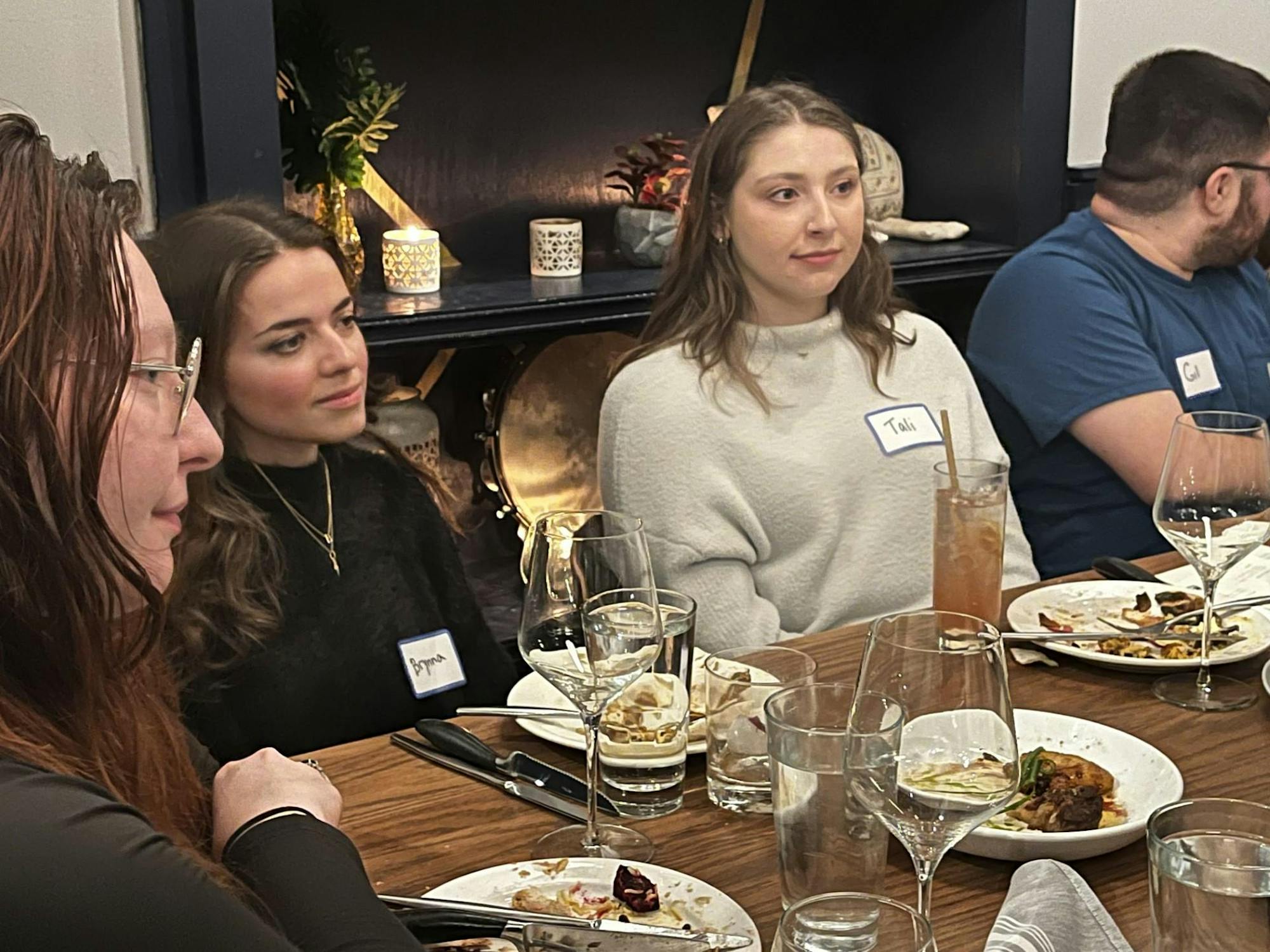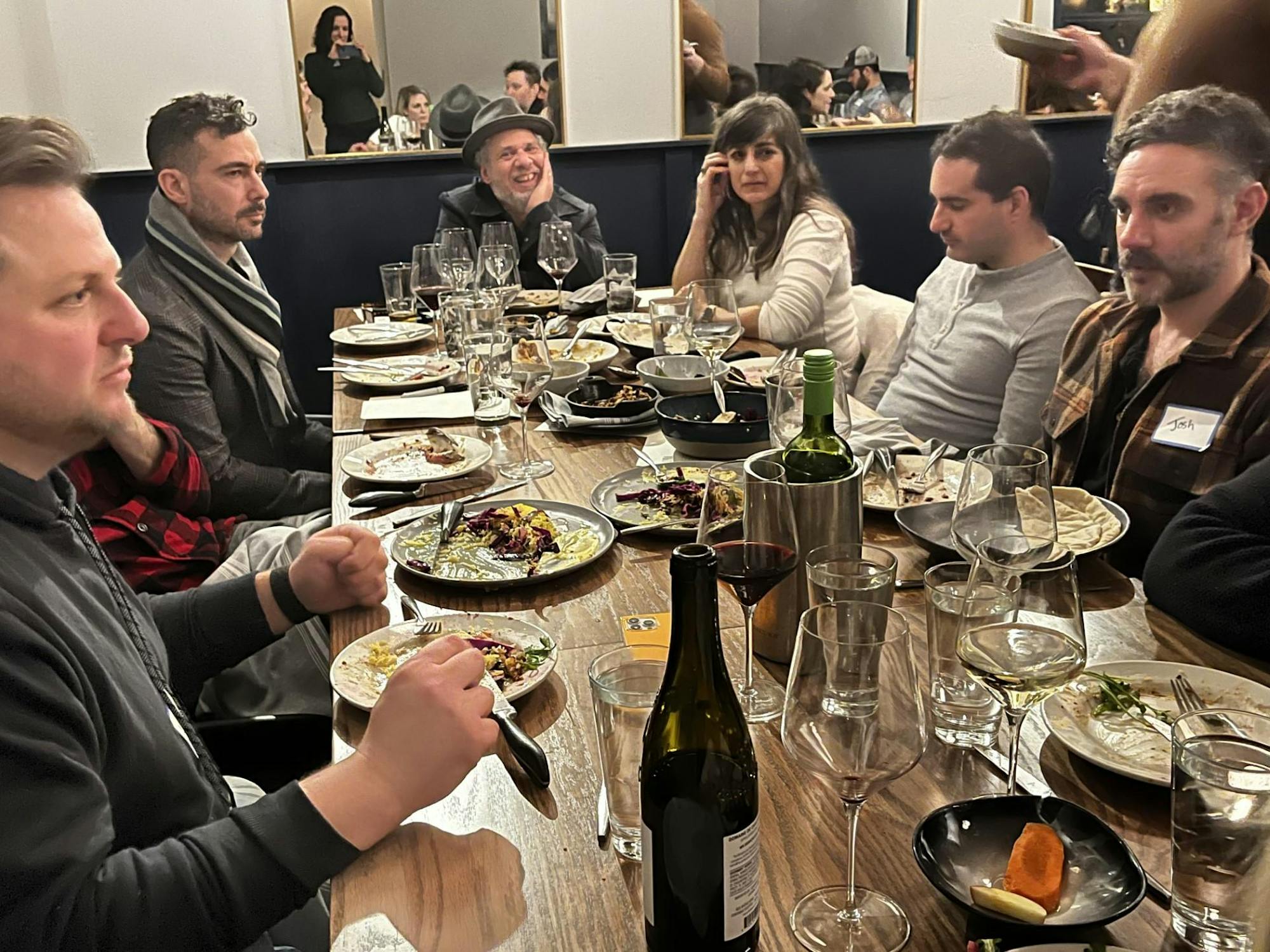Glasses clinked and chatter filled the room over plates of hummus, pita, rice dishes and salad. More than 20 Jewish music professionals met for dinner at Lyra, a Middle Eastern restaurant in East Nashville, on Jan. 25. The dinner was part of a nationwide Shabbat of Love spearheaded by the Jewish Federations of North America.
Guests were seated across two tables, and each table had a “leader” to guide the conversation.
One of the table leaders was Michal Eskenazi Becker, director of planning for the Jewish Federation of Greater Nashville. She led a conversation about attendees’ emotional challenges as Jewish people in the aftermath of Oct. 7 — the day that Hamas attacked Israel, killing over 1,200 people.
“A lot of it was sharing experiences,” Becker said in a phone interview. “I think in the end, it was more feelings and emotional parts for us. It was shared values, challenges and experiences.”
She added that the purpose of the industry dinner was to hold a space to listen to others and talk about Jewish identity.
Ayelet Berger, a Madison resident, was the other table leader who helped organize the event. She said the conversation began with an introduction of attendees’ roles in the music industry, then how they experienced Judaism earlier in their lives and if the Israel-Hamas war changed that experience.
Berger said she felt the need to volunteer with the Jewish Federation of Greater Nashville in light of the Israel-Hamas war.
“I contacted [Becker] wanting to do something to feel like I could help somewhere when the war broke out,” Berger said in a phone interview. “And Michal had said that she had talked with a mutual friend of ours, Scot Sax, in the music business, and he was saying there are some musicians who are feeling like they don’t have a place basically to explore what’s happening, how it’s affecting them, their Judaism, because [of] the nature of their work.”
She added that musicians participate in writing sessions with people they may not know well, which could lead to a lack of comfortability discussing heavy topics.
“There wasn’t a cohesive group really [to] just come together and process everything,” Berger said of the music industry.
A country artist who attended the dinner said the groups talked for “probably two hours about things related to Judaism.” He asked to remain anonymous for safety reasons.


Myles Hoffman, an artist manager based in Nashville, was invited to the dinner, but did not attend due to a mix-up about the postponed date. He said he initially participated in a dialogue about how Jewish community members were feeling after Oct. 7 at the Edgehill Music Publishing office, but that the Jan. 25 dinner seemed more informal.
“From my understanding, [the] dinner was more in line of still having these conversations, but kind of doing it in a more social way so that people could actually get to know each other’s stories and stuff,” Hoffman said in a Zoom interview.
Neal Spielberg, an artist manager in the Nashville music scene, was also invited to the industry dinner but did not attend.
“It just feels like now, more than ever because of Oct. 7, we needed to come together to talk about what happened, try to help one another understand how to deal with it with our employees, with our coworkers, with our friends in the [music] industry,” Spielberg said in a Zoom interview. “So we just thought it was important to come together as a Jewish community within the industry and try to find ways to help each other answer the questions that sometimes you don’t even have the answer to.”
Becker, the main organizer of the event, said the purpose of the industry dinner was to hear one another out and create a space to openly share emotions and experiences, rather than analyze current affairs.
‘Cultural melting pot’
The music and entertainment industry is made up of “a lot of Jewish people,” according to Hoffman, but Judaism is hardly talked about, which he said explains why Jewish music professionals should band together in solidarity.
He added that the nonprofit organization JewBelong displayed a banner near his house that reads, “You just listened to Bob Dylan in the car? Well, he was Jewish. If you don’t like Jews, then you don’t like Bob Dylan.”
“I don’t think … the general public, when they perceive all these artists, they’re not really looking at the music they consume as a cultural melting pot of people that have made this happen,” Hoffman said.
The Jewish Observer is published by The Jewish Federation of Greater Nashville and made possible by funds raised in the Jewish Federation Annual Campaign. Become a supporter today.
Hoffman pointed to the Motown era of jazz as an example: Black artists including Stevie Wonder, Aretha Franklin and The Temptations were supported and funded by predominantly Jewish business managers and “back-end players.” Jewish employees comprised a “significant percentage” of Motown’s in-house staff, according to The Jewish Historical Society of Michigan.
“A lot of the time, music is not meant to be fragmented or put into a certain box of one specific culture or grouping of people,” Hoffman said. “It’s really always meant to be a melting pot and I find it interesting, especially in Nashville specifically. It’s been very much like country and Christian music together have always kind of been in parallel lines going on the same trajectory.”
‘A fraction of a fraction’
When Spielberg first moved to Nashville in 1983, he found himself in the religious minority.
“There were very, very, very few Jewish people, particularly [in] the country music business or Nashville music business, and I was made aware several years later that there was a small group — and I’m talking real small, like a handful four to six people — [that] used to get together during the annual Country Radio Seminar because people came in from all over the country.”
This group was known as “Jews in Country Music.”
Hoffman spoke to the importance of having Jewish-centered conversations within the music industry, since he said Jewish music professionals are vastly underrepresented in the South.
“It feels like being a Jew feels more and more marginalized,” Hoffman said. “It’s been this way for a long time, but especially over the past, however many months since October [2023], it’s very concerning to think that we’re in a very Christian town, like most of the music that is written by country artists or performed by country artists is Christian-focused.”
According to digital media company Ranker, “many” country singers are devoutly religious; a handful are practicing Catholic. Christianity is a large aspect of Southern culture, and country music is mostly based on Southern traditions and culture, so the genre’s lyrics and artists are heavily influenced by Christianity, per the Collegium Institute.
Hoffman, 23, said he recently graduated from Belmont University with hopes of becoming a music industry professional. Within the industry, he noticed that many band members and artists would publicly thank Jesus or God for their successes and accomplishments, largely leaving Judaism out of the spotlight.
“That has always been a discomfort for me ever since [the] days of first arriving in Nashville, by coming to college and being involved in such a Christian-associated community and being one of the only people that wanted to vocalize I’m Jewish,” Hoffman said.
He added that being in the vast minority compelled him to connect “as much as [he] can” with other Jewish community members and get involved in Jewish festivities and events.
Hoffman discussed what being a young Jewish industry professional means to him.
“That means keep being yourself, but just be open to the fact that there are other people like you, who grew up doing a little bit of Jewish stuff and kindle and develop a community around the fact that we are Jewish,” Hoffman said. “We all share something in the same industry, which is pretty niche. …Jewish music industry professionals is like a fraction of a fraction.”

